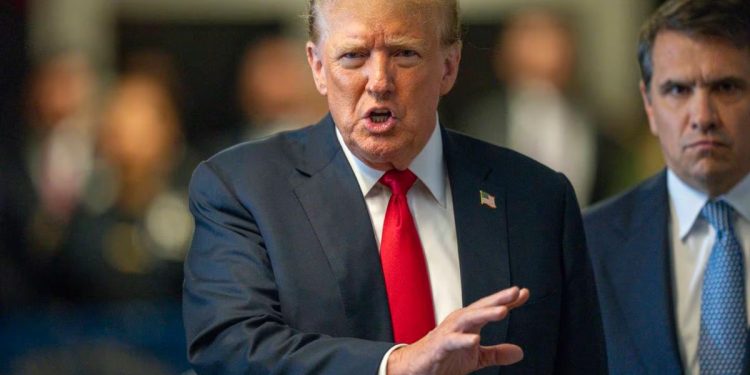The judge in charge of Donald Trump’s classified documents case in Florida has rejected the prosecutors’ plea to prevent the former president from making public statements that could potentially put law enforcement agents involved in the prosecution at risk.
Prosecutors argued before U.S. District Judge Aileen Cannon that the restriction was essential for safeguarding law enforcement against potential threats and harassment. This came after the presumptive Republican presidential nominee made unsubstantiated claims about the Biden administration wanting to harm him during a search of his Mar-a-Lago estate in Palm Beach, Florida, almost two years ago.
The ongoing feud between Cannon, who was appointed to the bench by Trump, and the prosecutors has reached a new level. The prosecutors have accused the former president of unlawfully retaining classified documents at his Mar-a-Lago estate after leaving the White House in 2021, as well as impeding the FBI’s attempts to retrieve them. Trump, however, maintains his innocence and denies any wrongdoing.
In hearings and court papers, Cannon has consistently criticized prosecutors on various issues. During one hearing, he even went as far as telling Smith’s team that they were wasting the court’s time. Prosecutors, on the other hand, have expressed their frustration with Cannon’s rulings. In a recent court filing, they mentioned that one of the judge’s requests was founded on a fundamentally flawed legal premise.
Prosecutors are seeking action in response to a misleading statement made by Trump earlier this week. Trump claimed that the FBI agents who conducted a search of his Mar-a-Lago estate in August 2022 were “authorized to shoot me” and were “locked & loaded ready to take me out & put my family in danger.”
In a court document, it was revealed that the FBI followed a standard use-of-force policy during the search in Palm Beach, Florida. This policy prohibits the use of deadly force unless the officer conducting the search reasonably believes that the individual being searched poses an immediate threat of death or serious physical harm to the officer or others. The presumptive Republican presidential nominee highlighted this disclosure, implying that it raised questions about the actions of the FBI during the search.
In court documents filed on Friday, prosecutors argued that by falsely suggesting that federal agents were involved in a plot to assassinate him, Trump put law enforcement officers at risk of threats, violence, and harassment. They requested that the judge prohibit Trump from making any statements that could pose a significant and foreseeable danger to the law enforcement agents involved in the case.
In a court filing late Monday, defense attorneys argued that the proposed restriction on Trump’s speech by prosecutors is “unconstitutional.” They pointed out that the identities of law enforcement officers involved in the case are protected by a court order that prevents their public release. The defense team also stated that they had requested a meeting with Smith’s team on Friday to discuss the matter before the prosecutors submitted their request, in order to give the defense sufficient time to consider it with Trump.
In an urgent email to the defense, prosecutor David Harbach emphasized the immediate need to address the situation. He stated that Trump’s actions had created a pressing need for relief, which could not wait until the weekend to be filed. While Trump’s lawyers did not perceive any “imminent danger,” the prosecutor argued that Trump had persisted in making false statements, thereby tarnishing the reputation and safety of the agents who conducted the search.
According to Steven Cheung, a spokesperson for Trump’s campaign, the case involving the documents was nothing more than a political sham right from the start. Cheung expressed the opinion that the case should be completely dismissed.
Trump is facing four criminal cases as he tries to win back the White House. However, it is uncertain whether any of the other three cases will go to trial before the November election, apart from the ongoing New York hush money prosecution.
In two of the other cases, officials have already imposed restrictions on Trump’s speech due to his incendiary comments that are believed to jeopardize the integrity of the prosecutions.
In the New York case, Trump has faced fines and the threat of jail time due to his persistent disregard for a gag order. This order prohibits him from publicly discussing witnesses, jurors, and certain individuals associated with the case.
As part of his federal criminal election interference case in Washington, he is also bound by a gag order. This order restricts his ability to discuss witnesses, lawyers involved in the case, and court staff. However, an appeals court has granted him permission to speak about special counsel Smith, who is the one prosecuting the case.










